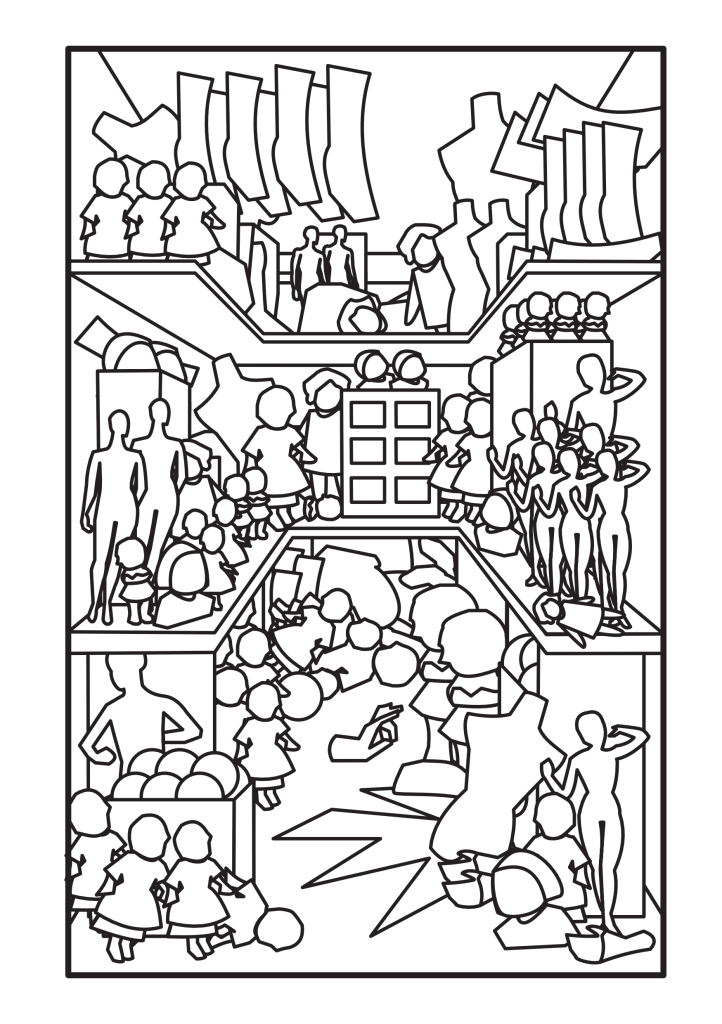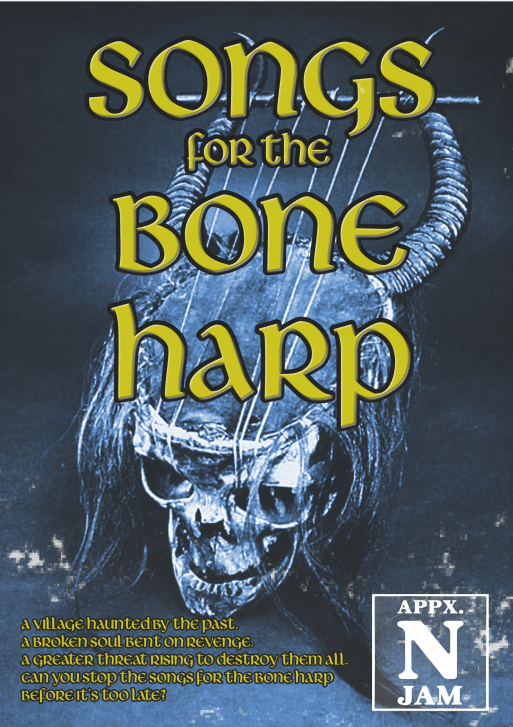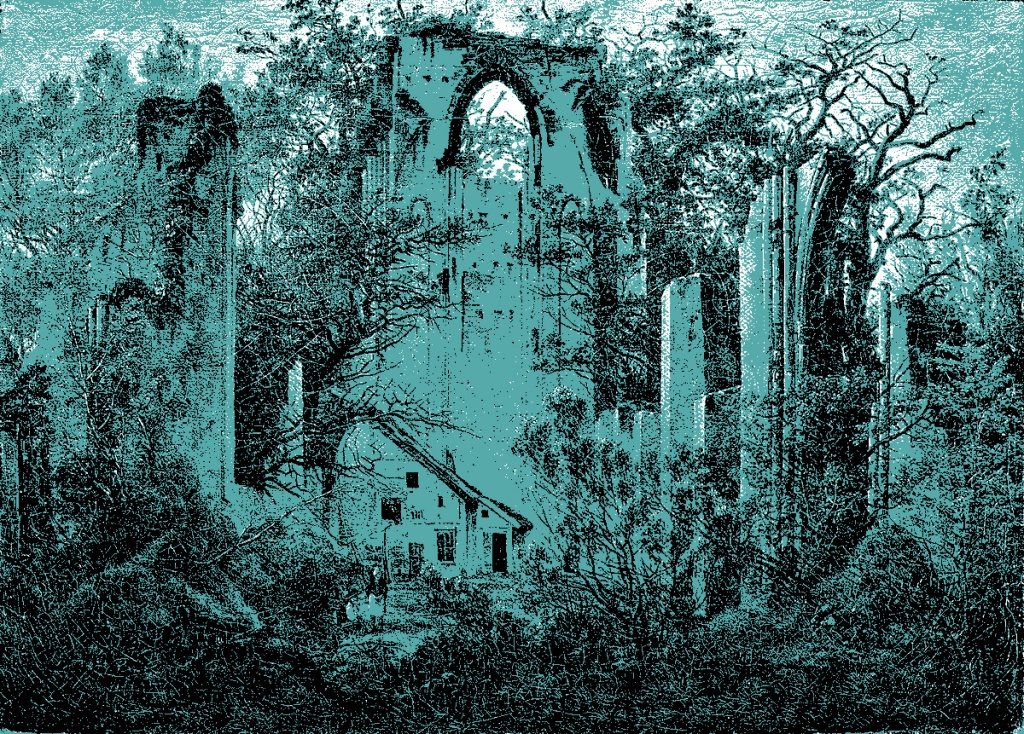February 2026 post: Queen of the Hollow House and More
Hello.
It’s certainly been a bit. I wanted to share some things. Last week I posted a new trifold dungeon to my Itch page: The Queen of the Hollow House. It’s a haunted ruin adventure for fantasy games. It’s inspired by an idle afternoon’s flip through of Moldvay’s Basic edition of Dungeon & Dragons and the arthouse film Last Year in Marienbad. And late last year I published this longish adventure location for Mausritter: The Box of Night. It’s kind of the Addam’s Family meets Charlotte’s Web, but creepier. If you ever wanted to have mice run around a spider infested doll hospital, then this is the adventure for you!

I’m not around here much anymore as you can see. I do send out a weekly update to backers on my patreon, which you can read for free. That’s where I talk books and everything else that kicks around my brainpan. So if you’re missing my ramblings, they’re just one click away.
Take care.
Songs for the Bone Harp
Over on itch.io, before the bad times began, some good people proposed having an Appendix N Jam. For those who don’t know, Appendix N was the part of the first edition AD&D Dungeon Master’s Guide that listed inspirational materials. It was basically a list of sword & sorcery style fiction. The way it worked was participants got assigned a random “pulpy” sounded title and had to write an adventure to suit. My title was “Songs for the Bone Harp” and this is the grim mystery I made for it:
I wanted something that looked like it came from a strip-mall game store circa 1985. Something that sat between Harn, MERP, and the fiction of Fritz Leiber and CJ Cherryh. The village map comes from Dyson Logos and the picture is the “Skull Lyre” a creepy musical instrument in the Met’s permanent collection.
And check out these submissions from friends:
… and check out all the other entries here.
“Last Stop: Tomb City” at Beneath Ceaseless Skies
. . . and so.
My story “Last Stop: Tomb City” was published at Beneath Ceaseless Skies a bit over a month ago.
This is the link that will take you to it.
It’s a story that asks the important question what if you were a very nervous man and Elric showed up one day needing your help rescuing a captive from an undead life coach?
Random online strangers have called it “terrific”, “marvelously deranged . . . like a condensed space opera” and “recommended for fans of Terry Pratchett, Douglas Adams, and anyone who enjoys their cosmic horror served with a side of bureaucratic absurdity.”
Doesn’t all that sound nice? If so, press the link and be transported to a world of bureaucratic absurdity!
Schrodinger’s Catastrophe
I finally posted the cat-themed Mothership adventure I made a few months back to my itch page. Grab yourself a copy (it’s free!) and enjoy your time exploring a derelict spaceship that may or may not have a cat on board!
Some Recent Things
Hello.
It’s been a bit, and I have every intention of finishing the game write-ups. But not right now. Right now, I’m just pointing you towards some recent things I’ve finished:
Arkham Elementary is a one-page roleplaying game where you play as substitute teachers at a horrible elementary school. It’s a tweak of John Harper’s Lasers & Feelings, except horrible. The children have eldritch powers at their command. You have a classroom.

Lock Mess Mobster: Lock Boss Anguilla is a semi-human hybrid adapted to aquatic life. He has ruthlessly built a loyal following among the scavenger “sludge-larks” who ply the fetid industrial waste canals known as the Mess. While his early history remains shrouded in mystery, Anguilla now captains an old canal dredger from which he influences the surrounding region.
Lock Mess Mobster is a pamphlet adventure for Into the Odd detailing a damp gangster.
Lastly… witchcraft!
In September, I plan on starting a new Yesterweird read along of my Sylvia Townsend Warner’s Lolly Willowes. That’s going to be done via public posts on my patreon. If that sounds like something you might be interested in, then feel free to follow along. The posts are public, so there’s no billing.
And that’s the end.
Black Spaghetti Hack Session 09: A Real Man, At Last!
As mentioned last time, I came up with a death twist for each of the players at the start of the campaign. These have changed as the game has gone on, but for Don Hector I wanted to have a misguided fairy godmother turn him into a flesh and blood person, instead of a marionette made out of wood.
So, that’s what I did. Please let me know if you think this was a good or bad idea.
Night falls and Don Hector’s body is prepared for burial by the village priest. Ha’Des and Nicolo are staying with the priest as well. It’s Nicolo who discovers that Don Hector has been transformed from wood to flesh and blood, and is now awake and asking for food*. This all gets sorted easy enough and we play it as a montage sequence with Ha’Des and Nicolo teaching the reborn Don Hector, now dubbed Chad Hector, how bodies work. Chad Hector is not happy with any of this. But so it goes. The priest and scholar agree to keep Don Hector’s rebirth a secret, because I don’t want the party to get side-tracked.
None of this stops the funeral in the morning. Ha’Des and Nicolo attend mostly for the free food. Speeches get made. Duke Testaccio speaks glowingly of Don Hector’s bravery. Sylvena tells of her tragic love for Don Hector. And Pontiacci holds the marionette baby (dubbed Ash Hector) and says he will raise the child as if they were his own. He also plans on staying in town to help the Duke (and probably marry Sylvena). There is weeping. Then the casket with a log inside gets buried.
The party decides to indulge in some needed down time.
Ha’Des is annoyed because Chad Hector being flesh and blood means there’s another mouth to feed, and they now need to find food for him. Nicolo hangs out with the scholar and learns that she’s not a vampire, but an inventor like himself. She teaches him how to make a scrying glass that can detect living creatures even when they’re hidden from sight. However, Nicolo has no time to work on making one for himself, as news has reached the town from San Uzzano.
Remember all those stories about rats they kept hearing?
Turns out a witch employed by one of the mercenary armies summoned all the rats to Uzzano and then during a dinner honoring the other mercenary captain she used a fey artifact to change all the rats in the city into goblins.** The consensus among the populace is that this is not how wars are supposed to be fought, and isn’t it just awful.
The party also learns more about the mountains.
The place they want to get to is called the Devil’s Bridge, which was built a thousand years before by Roman Plutonian wizards and their demonic allies. The bridge spans the river and once on the other side, they’ll only be a day or two*** away from their destination (a ruined village called San Basle). There are three trails they can take: the High Path into the mountains. There are griffins, a monastery of reclusive brawly monks, and ruins left over from the Cyclopean Age. The Middle Path leads through a valley and is the fastest, but at the far end is where the ogres have their base. Last, there’s the Low Path. This goes by a once sacred spring and is home to ferocious serpent-cats and witches (supposedly).
The party hates all these options, but in the end decide to take the Low Path. They spend another night in town. Using the opportunity to take another bath, before buying some supplies in the morning and setting out.
Almost at first things start going wrong.
They annoy a peasant, whose actually the local Benandanti, and he throws a wasps’ nest at them. The party scatters and spends hours lost in the woods. They regroup, realize they won’t make the spring before nightfall and decide to camp.
The night passes uneventfully, save for the howling of wolves in the valley north of them. As they prepare to set out in the morning, a pack of serpent-cats fall on them from the trees. These get driven away, but the party’s injured and filthy now. Also, half their food has rotted unexpectedly during the night (the Benandanti’s second action). Undaunted, the party presses on. Nicolo spots a pillar marking a Plutonian road and suggests they follow that. This takes them up a hill, where they encounter a barrow mound****. Nicolo promptly freaks out (he was a prisoner of the fey as a child), turns around, and walks back the way they came. Ha’Des and Chad Hector notice nothing, but follow Nicolo back down the trail. Hours behind schedule they reach the spring at last.
The spring is overgrown and semi-wild, and the party wants nothing to do with it nor with the ruined temple***** they can see near it. They sneak away, avoiding some dozing serpent-cats, and make camp north of the spring where the ground rises once more. Night falls. Tomorrow they hope to reach the Devil’s Bridge. The party begins to prepare a meager meal, but before they can eat something weird happens with the camp fire.
Tune in next time to discover what it was.
NOTES
1* Marionettes don’t need to eat, drink, or breathe. Don Hector’s player made this a cornerstone of Don Hector’s personality much to everyone’s groaning.
2* The party would’ve got caught in this mess (and had a chance to prevent it) if they had gone to San Uzzano. At least now the party learned what those rumors were about.
3* Hahaha. The party made it across but are now stuck in a pocket dimension for who knows how long.
4* The inhabitants would only have interacted with the party if they’d camped near it, and even then they weren’t _that_ bad.
5* They would have encountered the Benandanti here again and had to deal with him and his mom issues.
Black Spaghetti Hack Session 08: Don Hector’s Deadly Dance Party
And here here we are…
To recap: the party, a trio of rogues (Don Hector a Marionette Matador, Ha’Des a demonic duelist, and Nicolo a tinker-smith musician), have learned the location of a vast treasure hoard. It’s located in a ruined village called San Basle on the other side of the map from where they are. In between the party and the treasure are two armies. The party, not wanting to get mixed up with either army and their war, detours far to the north hoping to find a rumored smuggler’s route across the river. After a recent deed of valor, Don Hector and the rest of the party has been invited to a local lord’s house for dinner. As this is near to the mountains, the party’s only to glad too accept. A carriage takes them north, where they arrive just as the party starts…
The herald introduces the players: Don Hector, the Clinician of Pain, and his fool, Ha’Des, and musical montebank, Nicolo.
Don Hector’s “servants” are asked to perform for the crowd. Ha’Des tells jokes and Nicolo juggles knives. The crowd loves it, and the party separates. Ha’Des and Nicolo get taken into the kitchen where they spend time with the other servants and hear a grossly distorted version of what happened to Don Danny’s daughter in San Spotello. Meanwhile, Don Hector and his baby remain with the nobles.
There’s the Lord who’s the host, his morbid teen daughter (engaged to Count Chico), her elderly marionette governess, the clumsy doctor and his spinster sister, the local priest, and a visiting scholar from the university (that the party worries might be a vampire because she wears tinted glasses). Don Hector asks about the ogres in the mountains and hears a whole litany of horror stories, and complaints from the lord that his militia aren’t trained well enough to fight them.
In the kitchen, the party hears more about the rat streams and it’s agreed that all the rats are heading for San Uzzano for reasons unknown. (San Uzzano is the big local city that the party’s been avoiding.) They also learn that Gwardo Isnardo (the sage who solved the puzzle for the party) got attacked by persons unknown. This info clues the players that some other people might be hunting for the treasure by now.
Back at dinner, Don Hector is making a lot of charisma and dexterity checks to not do anything too unforgivable. He’s gotten a lot of attention from the lord’s daughter and that’s starting to make things awkward. Also, he’s had questions asked about his past – stuff like was it really true he got arrested for pickpocketing. He manages well enough, but is relieved when the lord calls in the musicians. Except when the dance party begins, Don Hector’s first partner is the lord’s daughter!
But first, back in the kitchen, Ha’Des asks about the Hagardini, the supposedly dead noble family whose lands the party will have to cross on the other side of the mountain. They get an earful of horror stories, but one makes Nicolo realize he’d encountered one of the Hagardini family while in the fey realm. He does not want to repeat this experience. One of the servants brings up how even this house they’re all sitting in is haunted.
Meanwhile on the dance floor, Don Hector has begun doing a Cossack kick dance as a way of avoiding contact with the lord’s daughter. She is into it and is about to start slam dancing with him when her dad asks that a more traditional dance be done. This sends people between partners, and sets off another cascade of charisma checks for Don Hector’s player to sweat through.
Ha’Des gets the servants to talk more about the haunting and they all agree that there is something very wrong in the wine cellar. Nicolo wonders if they might have a bottle of the San Basel vintage, and the cook says they do. Ha’Des, Nicolo, and a servant set off for the wine cellar.
Dance. Dance. Dance.
Cellar stairs. Cellar stairs. Cellar stairs.
Don Hector gets parenting advice from the elderly governess who has unexpectedly taken a liking to him. (The dice dictate!) Ha’Des, Nicolo, and the servant reach the darkest wine cellar. They hear a scraping in the wall. Ha’Des smells murder in the air. (I gave malebranches the ability to ‘smell’ sins.) Up above, the dance goes on and the Lord’s daughter waits for Don Hector when the herald reappears, clearly disturbed. She announces a late guest: Count Chico!
Heavily bandaged, Count Chico has managed to make the dance after all. Seeing the one who “caused” his injuries dancing with his bride to be is too much. The gauntlet gets cast. Count Chico challenges Don Hector. All eyes fall on Don Hector. Don Hector accepts, saying they can fight at dawn. Count Chico says no. Don Hector must face his champion now!
What champion? Don Hector says.
And in walks, Pontiacci the swordsman they played cards with back in session 2. He’s delighted to see Don Hector again and even more thrilled to learn that they’ll be fighting each other.
For some reason, our game group likes to use Doug Judy as an NPC in our games. He might not show up in every campaign we play, but there’s a non-zero chance that he might. Here he was an affable foe, like a two-handed sword wielding golden retriever.
The party guests all go out to the garden. The doctor hopes to do some resurrection. The lord’s delighted, his daughter even more so (the men are dueling over her!). The only one sweating is Don Hector, who realizes now his companions are nowhere to be found.
That’s because they’re in the deepest wine cellar with some horrible thing stalking through the dark towards them. The servant flees. The party sees a twisted marionette approaching. He’d been sealed up in the walls a hundred years or so ago Amontillado style. He’s thoroughly insane from wood rot. Battle ensues.
Above, Don Hector demands an apology from Count Chico. Chico refuses. The duel commences. Pontiacci shatters Don Hector’s cutlass. The lord gives Don Hector a family blade to replace the broken one. The duel continues.
Below, Ha’Des and Nicolo try to slay the deranged marionette without inhaling any spores from his rotted wood. After fire and the clash of steel, Nicolo pins the marionette to the wall and Ha’Des manages to kill it.
Above, Don Hector reveals how Count Chico got injured and needs cash. He also manages to disarm Pontiacci. Count Chico is too furious to end the fight. He gives Pontiacci more gold to keep fighting. Don Hector tries to reason with Pontiacci, but there’s no stopping the swordsman.
“A mercenary has a reputation to maintain,” Pontiacci says as he swings.
Crunch!
A crit.
Pontiacci’s sword connects squarely with Don Hector. Maximum damage is rolled. Don Hector is down. The recovery roll fails. Don Hector’s head been severed from his body. A hushed silence falls over the crowd.
Elsewhere, Ha’Des and Nico find the servant and gather some wine and return to the kitchen. They tell the tale of their encounter with the crazed marionette. They also learn what just happened to Don Hector and rush out to the garden.
The mood is somber. The doctor is apologetic for letting their friend die. The Lord is sad. His daughter spits in Count Chico’s face and breaks off their marriage. Even Pontiacci is sad. He breaks his contract to Count Chico and goes to console the lord’s daughter. The lord tells Ha’Des and Nicolo that he’ll pay for Don Hector’s burial. And the village priest takes away the body. But the governess steps forward. She announces that all is not lost. She shows the assembled crowd the marionette baby Don Hector had kept hidden under his hat throughout the party.
… and so the adventure ended.
Don Hector is dead.
Or is he?
Next time, it’s Session 09: Over the Mountains.
NOTES
I really recommend splitting the party and cross-cutting between groups. Games like Dungeon World, Blades in the Dark, and Brindlewood Bay really reward this sort of play. Raw D&D maybe not so much, but once you get the hang of it in Blades in the Dark or wherever you can get an idea of how to do it in D&D. The tension in this adventure was pretty fun and couldn’t have been done without exercising those chops.
Use old paintings and etchings to make tokens, point crawl maps, and scene backdrops! Brancalonia especially benefits from this. You don’t have to photoshop them like me, but it’s a real simple way to get some coherent flavor to the game.
For rumors and gossip during big social encounters with lots of people keep things to three categories: local lore, current events, and set-up. Each NPC has a primary one they’re interested in and a level of knowledge of it. This way you can more easily keep track of what info each NPC in a scene might know and how accurate it might be. So the scholar talked adventure set-up, while the doctor talked current events, and the old gardener dispensed lore. It motivated the players to try and chat with as many people as possible. Also, mix in inaccurate stories about the party’s own exploits. Things that make them sound better or worse than they are.
Dead PCs. Early on in the campaign I thought up death twists for each of the PCs. Something that would happen when/if they died. I’m not sure how well this works as an idea, and whether it removes the tension of potential character death from the game, but that’s what I’m trying in this campaign. These twists have also changed as the campaign’s gone on and the party has entered different regions. I’m still not sure if this is a good idea or not. With the introduction of a rival party, it gives you a group to switch to if the main one gets TPKed.
Black Spaghetti Hack 07: Monte Luca and the Beasts Found There
The party gets presented to Countess Matilda who is coddling the harpy children. The children hiss and spit at the party, before getting taken away to their gilded cage. Don Hector introduces himself as the Clinician of Pain. Countess Mailda explains how her darling children found a cursed bauble in the old hedge maze and it woke the evil crows and transformed her kids into harpies. Won’t Don Hector, the Clinician of Pain, and his brave companions do something?
Don Hector says they will. Nico is skeptical. Ha’Des examines the bauble and determines it’s a fae relic. Nico asks questions about the maze* and learns it’s mostly harmless but has been weird lately. Things shift unexpectedly in the place now, and there are strange sights. Nico mutters “great” and without further ado the party gets escorted to the maze where they’re told to return the bauble.
But right as they set off, there’s the sound of breaking glass as the harpy children break free from the house.
I ran the maze with a delving deeper sort of mechanic (like in the Stygian Library book). Each player made a test to see if they made progress. Meanwhile, each failed test triggered an encounter. Some were weird locations, some were attacks from the crows or the harpy kids, others were shifts in the fabric of reality.
One location was a statue depicting a devil torturing a jester, and the devil looked a bit like Ha’Des. At another statue the party saw something glowing and investigated. Nico climbed to the top and found a marionette baby** sleeping in a bowl carried by the statue. But before he can do anything the crows appear. They attack. Nico does some damage but gets the worst of it. The party flees. Nico tells Don Hector what he saw in the bowl. Don Hector returns for the baby. The party follows. They get the baby just as the crows return. Violence occurs. The party flees deeper into the maze, Nicolo badly injured and out of fuel for his firelance***. The harpy kids reappear hauling a large bucket of manure between them.
Bombs away!
Don Hector and Ha’Des get splattered in shit. (Laundry mechanic!) The party presses on. At last they reach the maze’s center where they know the kids found the bauble. There’s a crypt there half overgrown by a rose bush, but the door is open and only void is visible in the crypt. The party quickly concocts a plan to lure the crows into the crypt: Ha’Des will be bait, Don Hector will slam the door, and Nico will seal it by replacing the bauble.
The crows appear, the harpies following. There’s a round of chaos, then a round of perfect rolling. The plan works. The crows are sealed in the crypt. The harpies fly off in clumsy formation. The party heads back to the countess to say they have solved the problem. The guards take the party to a suite of rooms, and the next hours pass tensely with the party realizing their fates are tied to the harpy kids’ fates. Also, Don Hector proudly declares that he’s keeping his baby.
Morning comes. The kids are sick but no longer harpies. The guards are less hostile to the party. Don Hector demands a bath.
The party sets in to rest, but as they eat lunch a herald arrives. She is from Testaccio and wants to escort Don Hector and his entourage there as guests of the local lord.
Turns out the lord has a dinner planned, but one of the guests couldn’t attend and the herald was sent to find a noble to fill in the empty spot. By chance she found Don Hector and was happy to hear from Countess Matilda that he was a true hero. The party gets in the waiting coach and sets off at speed for Testaccio. On the way they learn some rumors from the herald:
- Count Chico was the guest who couldn’t attend the dinner due to his injuries.
- Count Chico is arranged to marry their host’s daughter.
- The ogres control the forest north of Testaccio and make travel over the mountain difficult. The local lord is hoping to hire someone to get rid of them.
The coach arrives in Testaccio as night falls. The herald goes forth to announce the party, introducing them as Don Hector, the Clinician of Pain, his jester, Ha’Des, and musical dogsbody, Nicolo. The party enters the manor house.
Next adventure: Don Hector’s Dance Party!****
* The hedge maze was the Garden of Bomarzo.
** One of those random encounters where you’re tempted to reroll because babies can derail campaigns, but I didn’t and so the party has a baby marionette… for now.
*** Nico has two devices: a firelance and a music box that puts people to sleep. These got reimagined into a fire-spewing, sleep-inducing hurdy-gurdy.
**** Don Hector’s failed dex checks were legendary, so we joked about them as Don Hector’s Dance Party, and that’s where the next adventure’s idea came from.
Black Spaghetti Hack Session 06: The Road to Testaccio
The party flees San Spotello, fearing retaliation from crime boss Don Danny, after they, the party, destroyed Don Danny’s daughter’s wedding cake. They know they need to cross the river to reach San Basel, where the treasure’s located, but aren’t sure which route to take.
To the west is the city of San Uzzano. Unfortunately, the road between Spotello and Uzzano are crawling with mercenary forces, and one of these will want to recruit the party. The party, not wanting to be recruited, decides against that.
So north or south?
It’s possible the witches in the southern marshes will have a way to get the party across the river. But, witches being witches are scary, so the party decides against this. This leaves the north route through the Butchers Wood and Paleface Mountains on a rumored smuggler’s road that’s now home to ogres.
Not great choices, but the decision gets made and it’s the north route. So, off the party goes. They encounter a farmer and buy some food from him and try to learn what they can about the road ahead. The farmer dispenses rumors:
Monte Luca is the next town on the road and supposedly some children there have been afflicted by a curse there. The farmer’s not sure, but tells a story about an ancestor of the current ruler having had congress with a snake.* And if that wasn’t bad enough, Monte Luca’s other notable feature is that it has an ancient hedge maze ruin near it.
Besides that, the party asks the farmer if the local sausage makers are actually cannibals.
This is one of those bits of information that’s stuck in the party’s attention more than I would’ve guessed. The farmer says he doesn’t think they’re cannibals, but that they may work with local crime bosses disposing of bodies.
At this point, the party realizes it’s nearly nightfall and they need to find a place to stay. Ha’des asks if the farmer will put them up for the night. The farmer agrees. Ha’Des overpays in silver, and the farmer says he’ll rent them a bath tub. They party bathes and sleeps in a barn. Nothing happens. Morning comes. The party sets off. They figure they can reach Monte Luca by nightfall if there’s no incident and fortunately for them there isn’t.
The one encounter they have is with a group of kids who tell the party about:
- Rivers of rats seen going west three nights ago.
- Bolli Bentpot was attacked by Don Danny’s goons.
- Don Danny is going to kill whoever ruined his daughter’s wedding cake and is heading to San Uzzano to find them.
The kids start asking questions back to the party. Don Hector fails to convince them that they’re just common travelers. Nico and Ha’Des start getting uncomfortable at all the interest from the kids, and just set off down the road. Don Hector follows, and the party is now moving fast. They want to get as far away as they can before anyone realizes where they’ve gone.
The next encounter isn’t until they’re almost in Monte Luca. As they near the town, the party sees a group hammering a sign into the ground saying: PLAGUE! KEEP OUT!
The party thinks this is a bluff to cover for the cursed kids story they heard from the farmer, and Nico tells the townspeople that Don Hector is a doctor. Don Hector leans into the part and the townspeople are convinced. They tell the party to find Countess Mathilda. The party reaches town and finds the streets empty and the houses shut up. Don Hector shouts “Hello!” They hear a door slam and movement in houses but no shout back. The party enters the town square.
Laid out before them in the middle of the town square is a long table heaped with food stuffs.
Adventurers go into adventurer mode: Ha’Des goes to the table. Nico sneaks across the square to the far side. Don Hector goes to the nearest door and knocks on it. A voice replies: “Get inside you idiot!” The door opens. A loud cawing comes from above the buildings.
Don Hector goes inside the building right as the sky turns black with crows. In the midst of the crows are two human bird hybrids**. They start singing over Nico’s head. Nico manages to resist their charm spell and force his way into a nearby building. Ha’Des however gets caught in the square as the crows descend. Injury ensues, but Ha’Des manages to get inside a building. Nico manages to resist another song (using his earplugs). And Don Hector gets told how the Countess’s (awful) children got cursed and brought this flock of evil crows upon the town. Ha’Des learns that at the rate the crows are eating, the town will be out of food within a few weeks.
Every one waits for the crows and monster children to eat. Once done they fly off, and the townspeople emerge to clean the filth splattered town square. Guards arrive, and they and the townspeople escort the party to the Countess, still believing Don Hector is a doctor.
* Rumors tend to be a mix of relevant and irrelevant lore. The snake story and the sausage makers are background details that never got investigated. The sausage makers might have become recurring enemies. Whether they were cannibals or not I will never tell!
** Straight-up harpies, but I made them cursed children that the party wants to avoid harming despite the harassment.
Black Spaghetti Hack Session 05: Bolli Bentpot’s Bistro
After the tollhouse battle…
The party spends the night with the mercenaries, and it’s a chance to divulge some regional lore. In this case it’s a mercenary singing a song about a witch who lives in the marshes to the south east and has a tendency to turn unpleasant trespassers into animals. Meanwhile, Toad-Faced Larry and his crew continue to give the stink-eye to the party.
Morning comes and people split up. The party joins the group heading to the nearby city of San Spotello. This includes another malebranche who tries to strike up a friendship with Ha’Des. The two get along fine, but split up when they reach San Spotello. That town is divided between Swansickle and Emperor Joe forces with a lot of brawls, but so far no battles fought in the streets. They also learn Count Chico managed to survive his house explosion, and they also start to hear tales of great rivers of rats moving across the countryside.
The party’s in town to find a chef named Bolli Bentpot who owns a bistro. They hire a tout to guide them, and before long they reach Bolli’s place. The party sits down in the dining area, but gathers that Bolli and his chefs are busy prepping for some function. Nicolo and Ha’Des distract the host and learn Bolli is prepping for the wedding feast of Don Danny’s daughter. (Don Danny being a local crime lord.) Don Hector takes a chance and heads to the back to try and find Bolli. Bolli’s easy enough to find. He’s working on a wedding cake. Don Hector starts asking where San Basel was located. Bolli’s about to tell, when there’s a commotion back in the front of the house.
One of the other customers has revealed themselves to be a former cafe owner driven out of business by Bolli and now he’s going to have his revenge. He’s gotten his hands on a fairy stone, and with this he unleashes a magic storm in this cafe. This of course makes all the plates assemble into cutlery golems and all the food in the place come alive. This includes the wedding cake Bolli’s working on.
Nicolo and Ha’Des do their best to keep the cutlery golems at bay, while Don Hector dodges evil cupcakes and the monstrous cake to grab Bolli and drag him from the bistro. The cakes and foodstuff follow, collecting more food stuffs now from surrounding houses. It grows into a giant blob and starts spewing cutlery and sausages as a breath weapon. Nicolo and Ha’Des harass the thing from the rear, but they never get too close since neither of them wants to get cake splattered and have to do laundry.
Don Hector drags Bolli to a guard tower. The guards ain’t happy to see them, but can’t do anything because soon the food golem’s in the place attacking. Don Hector and Bolli flee higher up the tower. The cake monster starts climbing the side. Don Hector and Bolli reach the top of the tower and have no where left to go. Don Hector tries to drop some rocks on the monster, but does minimal damage. The creature reaches the top of the tower. Nico and Ha’Des watch from the bottom of the tower. Don Hector looks around and sees a full water cistern in an alley below. He grabs Bolli and leaps off the tower. The creature leaps off too.
Death saves and Dex checks get made.
Don Hector and Ha’des pass. Bolli, Cake Beast, and Nico fail.
SPLAT
Ha’Des and Don Hector see if it’s possible to revive Bolli or Nico. Fortunately, both manage to recover. Bolli tells the party San Basel was located across the river to the north west. He also tells them that Don Danny won’t be happy to hear how they ruined his daughter’s wedding cake. The party decides it best to leave town, battered and filthy as they are. They grab food and clean outfits in the market but don’t even pause to change.
Night starts to fall.
Now all they need to decide is how they’re going to get across the river.
- This whole adventure was inspired by the polenta golem in illustration in the Brancalonia main book.
















